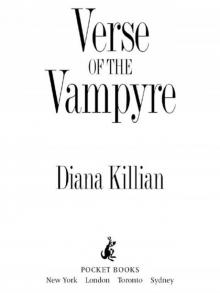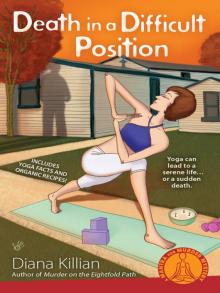- Home
- Diana Killian
Docketful of Poesy Page 20
Docketful of Poesy Read online
Page 20
Whoever had hired the Februarys apparently didn’t know any better—or hadn’t been in a position to pick and choose.
I said, interrupting Brian’s discussion of forensics, “Were you able to find out anything about the other members of Peter’s team in Istanbul?”
He gave me a long, level look. “Yes. Davey Donnelly was the driver. He died last year in a car smash-up on the M42. The other two men were Lew Shaw and Martin Collins. Collins is currently serving time at Franklin Prison near Durham.”
“Are you positive —?”
He said with great patience, “I checked, yes. Collins is still a guest of Her Majesty’s Prison Service. Shaw—you’ll like this—entered the St. Mina Monastery in Mariut, Egypt, five years ago.”
It took me a moment to process what this meant, because if Brian’s facts were correct—and Brian’s facts were always correct—Peter’s former partners in crime were not trying to kill him. And how could that be?
As though reading my thoughts, Brian added, “Catriona Ruthven’s whereabouts are unknown.”
I opened my mouth to correct him, but then bit the words back. Instinctively I knew Peter would not forgive my betrayal of Catriona. It wasn’t logical or fair, but I knew it in my heart. He might not still love her, but a strong bond remained between them—which was why he had gone to Dordogne.
Though not, apparently, to ask her to intercede with their former co-workers.
Why then? Because I knew Peter was right: if Catriona wanted him dead, she’d handle it personally. The only other time I could remember him trying to contact her was when Hayri Kayaci, one of the guards at the Turkish prison where Peter had been held, had turned up trying to blackmail him. Peter had gone to France to warn Catriona that, in his own words, “the vermin is gnawing its way out of the woodwork.”
What had he gone to tell her this time?
“So you see,” Brian said, “Nobody in Fox’s past is out to get him. I think he unwisely used the February brothers in some deal that went sour. And when they tried to get payback, he had to eliminate them.”
I raised my gaze from my confused thoughts to Brian’s intense expression. He genuinely believed what he was saying. He disliked Peter too heartily, believed too firmly in his guilt, to see how unlikely that scenario was.
He said softly, “He’s a villain, Grace. An attractive, charming villain. Why can’t you see it?”
That one may smile, and smile, and be a villain.
I said, “There’s no point saying this to me, Brian.” I remembered Peter’s words at Craddock House that awful morning. I can’t keep proving myself to you, Grace. Sooner or later you have to take me on faith—or admit that this isn’t what you really want. I felt the curious sensation of prickling behind my eyes. Was that how it had seemed to Peter? That he was forever having to prove himself, and never quite reaching some invisible yardstick? Why had he kept trying? He was the man who said that commitment, steady relationships, routine had never been his thing, but he had kept attempting to build those things with me.
Brian reached across the table, covering my hand with his. “Grace, you know how I feel about you. I can’t stand to see you tear yourself up over that worthless swine.”
“Stop.” I tried to say it gently, sliding my hand out from under his. “You can’t say these things to me and expect us to continue being friends. I love Peter. I trust him. I have faith in him.” I said it firmly, as though these were my wedding vows, and I thought that if I ever got to the point of marrying Peter, these would be my wedding vows because these were the things I expected of him as well.
“I have to say them,” Brian said, “because I can’t go on just being your friend. I feel too much for you.”
We stared at each other across the crowded tabletop. The half-eaten fish and chips, the vinegar bottle and salt shaker, the red-and-white-checked tablecloth: what a place for friends to part.
“If it wasn’t for Peter Fox…” he said.
“I don’t know that that’s even true,” I said, although I suppose it was. If it hadn’t been for Peter I probably would have fallen in love with Brian. But it was too late now, and “love” was a pale word for what I felt for Peter.
So maybe I did understand a little about why Laetitia Landon had been willing to risk everything, and even when things didn’t work out the way she planned, she had continued to see the grand adventure in her choices.
“You’re a smart woman in everything but this.”
It was painful because I liked Brian; I hated to lose his friendship, especially now when I felt more than a little cast adrift between my old life and my new.
I said, “Whom we love isn’t a logical choice, Brian, or you’d have picked someone other than a woman already in love with another man. It’s not as though I led you on or ever pretended to feel more than I do.”
He stared at me for a long moment. “I don’t know who I feel worse for: you or me. There doesn’t appear to be a happy ending in either of our futures.”
I was afraid he was right about that. After a moment, he said, “I’ll drive you back to the inn.”
*****
Todd was by himself in the bar at the Hound and the Harrier. The television in the corner was on, a news program playing softly in the background. Todd sipped what looked like whisky and watched the TV. He glanced up with something like relief when I sat down across from him.
“Where is everyone?” I asked.
He shrugged. “Dunno. Sunday night. Maybe they’re all catchin’ up on their beauty sleep.”
“Are we filming tomorrow?”
“Far as I know.”
“Doesn’t that seem a little odd to you?”
He studied me. It was strange because superficially he looked so much like Peter—and yet he was so different once I started analyzing him feature by feature. “Whole gig is queer if you ask me.”
“I do want to ask you, as a matter of fact,” I said. “It’s not my imagination, is it? This is a very strange production?”
“Yeah. Strange hardly cuts it, luv.” He sipped his drink. “Never seen anything like it. No location manager, no stand ins, no second unit. And ’alf the crew doubling for the other ’alf.” He shook his head disbelievingly. “’s mad, thass what it is.”
“The screenwriter isn’t usually on the set once the filming begins, right?”
“Right.”
“Have you ever worked with Miles or Roberta or anyone in this production before?”
“Nah. Never met any of ’em before this. ’eard about Miles, naturally. Virtual Ninja. Great film, that.”
“Because I heard the two of you arguing one morning.”
He looked blank.
“You said something like you both knew who was calling the shots or who wasn’t.”
“Oh.” He repressed a cheeky grin, and took another sip. “Yeah. Didn’t like the way he was filming the scenes, did I?” He raised a dismissive shoulder. “Deliberately kept shooting my bad side just to get her good side.”
I had to stop and work that out. “I didn’t realize you had a bad side,” I said finally.
He turned his left profile to me, waited—apparently giving me time to analyze the disaster area—then turned back with an inquiring expression.
I said apologetically, “I can’t really see a difference.”
“The camera sees a difference,” he assured me, reaching for his drink again. “Anyway, know it’s your book and all, luv, but the story is really about Pierce, innit? David, I mean. Peter.”
“Ah...” I decided to let that go. “So you were just discussing the way Miles was choosing to shoot you and Tracy?”
“Pretty much.”
“And what did you mean about Miles ultimately not being in charge?”
The blue eyes were quizzical. “’eard quite a bit, didn’t you, for someone who just ’appened along?”
“Your conversation caught my attention because Walter, the original screenwriter, said something very si
milar about Miles and Roberta not having final say on anything.”
Todd considered this. “Yeah, well. Wasn’t hired by either of ’em, was I? The call came direct to my agent. Didn’t have to audition or anything. Got the impression someone else was pulling the strings behind the scenes. Someone who wished to remain anonymous. You talk to Roberta? Never produced a film in her life. She’s an actress.”
Silently, I absorbed this. Mona had mentioned that she had met Roberta when they were both still acting, so I wasn’t totally shocked to hear it. “Do you know that for a fact?”
He nodded. “Mona told me. Mona knew everyone, didn’t she? Said Roberta admitted it to her when she hired her. They’d known each other donkey’s ears, see?”
“So Mona was hired by Roberta. Do you know if there were other actors who were handpicked the way you were?”
“Dunno.”
My attention was caught by the television. There was local news footage of Angela Hornsby making some kind of speech to a group of people in Wellies and plaid jackets. Todd and I watched for a few moments while the MP on the screen graciously did the honors and officially opened a local gardening center.
Roberta didn’t answer my knock right away. When she did come to the door, she wore a pale blue bathrobe, her hair wrapped in a towel, her face greasy with a facial treatment.
“May I talk to you for a minute?” I asked.
Warily, she backed up, letting me inside the room. As she closed the door after me, I looked around curiously. The room looked as if it had been ransacked. The bed was unmade, closet open, drawers open, suitcases turned upside down, clothes strewn everywhere. But apparently it was supposed to look that way because she simply scooped up the clothes piled on the only chair and threw them on the bed, gesturing for me to sit.
“Unfortunately, unlike you, I don’t have one of the royal suites,” she remarked, jerking the coverlet over the sheets, and curling up on the bed with her tumbled clothing.
“Home team advantage,” I said, quoting Peter. “You’ve got a nice view of the mountains though.”
She snorted.
So much for the small talk. I said, “I wanted to ask if we were shooting tomorrow?”
Roberta just stared at me for a long, long moment.
“Is there something wrong?” I asked.
“You know damn well there’s something wrong,” she said. “You’ve been saying since practically day one there’s something wrong.” Her eyes glittered behind the too-cute glasses.
I made sure I kept my tone nonconfrontational. “I’ve been talking to Todd. He said this is your first film.”
“And you already know that, too.” She reached over to the side table and picked up a pack of cigarettes. I hadn’t seen her smoke before, but then I’d never seen her look quite so nervous and haggard, either. “Just get to the point, Grace.” She lit up, and took a defiant drag.
I said, “I knew you didn’t have a lot of experience as a producer, but Todd says you’re actually an actress.”
“That’s right. Why, is there some law that an actress can’t move on to producing or directing?”
“Don’t get mad at me. I’m not the one who got you into this,” I said.
To my astonishment, her face twisted up and she began to cry. She cried soundlessly, but it was painful to watch for all that. I didn’t know what to do. I rose, moved over beside her on the bed, and put my arm around her shaking shoulders.
“What is it? Roberta?”
“Mona,” she said. “Maybe she would still be alive…”
“If what?”
She shook her head, pulled away from me, going over to the window and staring out at shadow mountains and the starry night beyond. After a couple of deep, shuddering drags on her cigarette, she got control of herself.
“I tried to reach our office in New York. I’ve been trying for days. Even before Mona…” She stopped, struggled for control. “The number is disconnected. I thought it was a mistake at first. I called a friend in New York and asked her to go drop by the building—the address I had. She went there, and it’s a giant empty warehouse. There is no Kismet Production Company.”
It took a little effort to absorb that. Although I’d been convinced there was something screwy with this project, I hadn’t really considered the possibility that, from beginning to end, the entire production of Dangerous to Know might be one gigantic fraud.
“But all the money,” I said. “Where did that come from? I’ve even received a paycheck. A nice one.”
“There was a company checking account,” Roberta said. She wiped her eyes. “But it’s been closed. Our company credit cards have been cancelled as well.”
“Maybe you better start at the beginning,” I said.
She nodded, struggled for control. “There was an ad in Variety,” she began.
Gradually, in between my interrupting with questions, Roberta got the story out. It was like something out of Sherlock Holmes. Roberta had auditioned for the part of “Producer” in the screen adaptation of an obscure nonfiction book by an equally obscure American schoolteacher living in the English Lake District.
“So there was never any real film production,” I said. I wasn’t surprised by then, but it was still disappointing.
“But that’s the thing,” Roberta said. “We really were making a film.”
“There was film in the cameras?”
“What part of really making a film do you not get? We had the authority, and the money, and the film—to go ahead and begin producing the movie.”
“We?”
“I suggested Miles for the project—we’d known each other, worked together—I knew he needed a project right away, and I knew I could…trust him. Mr. Green interviewed him, and then hired him as the director.”
Mr. Green? Why had they bothered? Why not just leave it at Mr. Smith and be done with it? “This Mr. Green —” I began.
“I’m sure he was an actor like me. In fact, I know he was, because I’d seen the ad he responded to in Variety the week before the ad ran that I answered. I just never put two and two together. Maybe I didn’t want to.”
“So did Miles know this was all make-believe from the start?”
“But it wasn’t,” Roberta told me. “That’s what you’re not understanding. We were supposed to go ahead and make the film. I told Miles the situation, and he was even more determined than I was to really make this film happen. We both needed it to be real, and there was no reason why it couldn’t be real. We had the money and the resources. We had the green light.”
No pun intended.
“But the project had been chosen for you already, and it was my book.”
“Yes. There was no negotiating on that.”
I tried not to be offended that she had apparently tried. The realization that my work—and I—had been deliberately targeted was a creepy one. “Who hired Walter Christie?”
“Mr. Green.”
Which explained how Walter knew that Roberta and Miles weren’t really in control of the production. Inexperienced as he was, either he knew enough about the way the business ran or something must have triggered his suspicions. Which made me wonder if Walter had not suffered an accident because he knew too much?
But then why not eliminate Roberta and Miles as well?
Too many bodies? Or because the film had to be made. Why? That was the real question. Why did someone go to the trouble of pretending to film my book?
“You, Miles, Walter, and Todd were all hired directly by Kismet Production Company. Was there anyone else who was hired directly by the mysterious Mr. Green?”
She shook her head. “Miles and I hired everyone else. We had a limited budget, but we were able to get a small crew together. We held auditions for most of the remaining roles.” She got choked up again. “I called Mona’s agent. We’d worked together before and I knew she’d be perfect.”
The implications were overwhelming. For a few moments I just sat there trying to take it all
in.
“So…when you originally asked me to take part in the production…?”
She wiped her eyes again. “We were told to try to get you on board one way or the other. To offer you any amount of money.”
“Why?”
“I don’t know!” She met my eyes. “Honestly. I don’t know. If I had to take a guess…I’d have thought it was all some ruse to meet you.”
“To meet me?” I was thinking about Walter’s accident. Surely that hadn’t been to insure that I would join the cast? But no. There was no guarantee that I would join after Walter’s death. And, in fact, I hadn’t any intention of signing on. Not until the production had moved to the Lake District.
Roberta said, “At first, yes. I thought it had to be some big romantic scheme to meet you. I’ve seen a lot of movies like that. I honestly expected Mr. Green to show up that first day you visited the set. But then later…I began to wonder.”
“After Walter died, you mean?”
She shook her head. “No. When the decision was made to film on location over here.”
“But that decision was made after Walter’s accident, wasn’t it?”
“No.” Her expression was wry. “That decision was made within a few hours of my telling Mr. Green that you couldn’t take part in the project because you were moving back to the Lake District. I was supposed to offer you the consulting job again, but then Walter died, so we just turned it into a script doctor position.”
“I really don’t understand,” I said.
I was thinking aloud, but Roberta said, “Join the club.”
“When did you find out the phone to Kismet Productions had been disconnected?”
“Yesterday morning. I hadn’t been able to get through all week. I kept getting an answering machine, and then I kept getting the message that the machine was full. Yesterday I learned the phone had been disconnected.”
“And you found out the company bank account had closed…when?”
“This afternoon. Pammy and I went out to pick up a few things. My card was declined. So was hers. I called my bank—of course they weren’t open, but according to the computer system—our account is closed.” She struggled against another flood of tears, and I didn’t blame her. The entire production crew was essentially stranded overseas. Never mind the destruction of the dreams of all these people who believed they had jobs but really didn’t, the “company” probably owed hundreds of thousands of dollars in equipment rentals, salaries, hotel, catering, and the like.

 High Rhymes and Misdemeanors
High Rhymes and Misdemeanors Corpse Pose
Corpse Pose Verse of the Vampyre
Verse of the Vampyre Sonnet of the Sphinx
Sonnet of the Sphinx Docketful of Poesy
Docketful of Poesy Death in a Difficult Position
Death in a Difficult Position Dial Om for Murder
Dial Om for Murder Murder on the Eightfold Path
Murder on the Eightfold Path